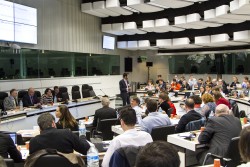COHESIFY Researchers: “EU spending through Cohesion Policy makes a real difference to how citizens perceive and identify with the European Union”
The results of the study were presented at a Conference in Brussels on 26 April to the EU institutions, representatives of national and regional authorities and academics. The presentations drew on two years of research investigating the question of how EU citizens perceive Cohesion Policy and whether they identify themselves with the EU. In addition, the project analysed how effectively the results of Cohesion Policy programmes and projects are communicated to citizens. The project applied an innovative research approach by combining: • desk research on cohesion policy performance and communication in 17 case study regions • 215 in-depth interviews and an online survey of 400 policy stakeholders in the regions • a large-scale telephone survey covering more than 8,500 citizens; • 47 focus groups with 240 citizens in 17 regions across 12 Member States; • a cross-national media framing analysis covering 6,700 news articles and 33,000 user comments to identify the dominant discourses on Cohesion Policy in the media ; • application of big data techniques to social media covering more than 115,000 posts/tweets and comments on Facebook and Twitter to understand awareness and sentiment of EU Cohesion Policy. The study is ground-breaking in providing a new and much more comprehensive view of how a crucial area of EU spending - Cohesion Policy, accounting for a third of the EU budget - is perceived by citizens on the ground. According to Prof. John Bachtler, lead COHESIFY researcher from the University of Strathclyde and responsible for coordinating the 10 project partners: “Cohesion Policy spending and communication makes a real difference to how citizens perceive the EU and European integration and the degree to which they identify with the EU. If EU policymakers want to promote regional and local identification with the EU, Cohesion Policy is clearly an effective instrument – but only if it is properly communicated.” The first session of the conference was dedicated to the results of the 47 focus groups conducted in the 17 regions across Europe. Dr. Andreja Pegan from Trinity College Dublin explained that “the discussions in the focus groups showed that the citizens of the EU have an implicit and cursory knowledge of Cohesion Policy. Citizens recognise the importance of Cohesion policy for addressing regional disparities and improving the quality of life, but feel they are inadequately informed. They want to have more say on how funds are allocated or governed in their area and expect the responsible authorities to improve their communication on Cohesion Policy.” Only a minority of the focus group participants considered that Cohesion Policy has had a direct impact on their European identity, although many supported the principles of the policy (especially the need for common EU action to address regional differences in economic development) and positive views were expressed about the impact of Cohesion Policy on the development of their region or city. While Cohesion Policy can also have negative effects on European attitudes and identity if it is not perceived to be addressing local needs, COHESIFY Project Manager, Dr Carlos Mendez (University of Strathclyde) said: “Overall, the findings provide clear evidence of the impact of Cohesion Policy on individual perceptions of the EU and European identity. The survey of more than 8,500 citizens in the 17 regions demonstrate that awareness and visibility of the ERDF and Cohesion Fund, and the perceived benefits for citizen's daily lives and for their region's development contributes significantly to citizen identification with the EU.“ More information on the results: http://www.cohesify.eu/final-conference(opens in new window)
Countries
Belgium



